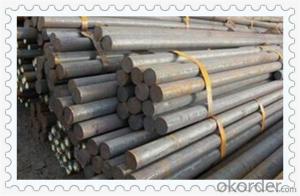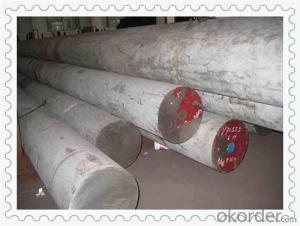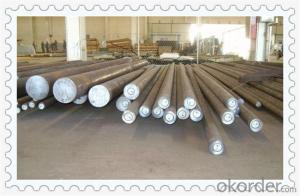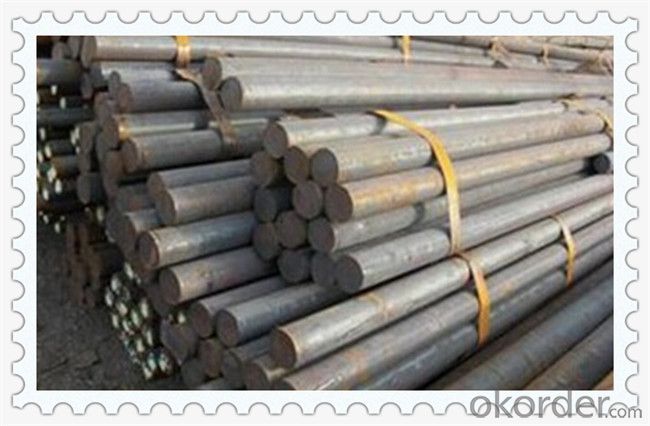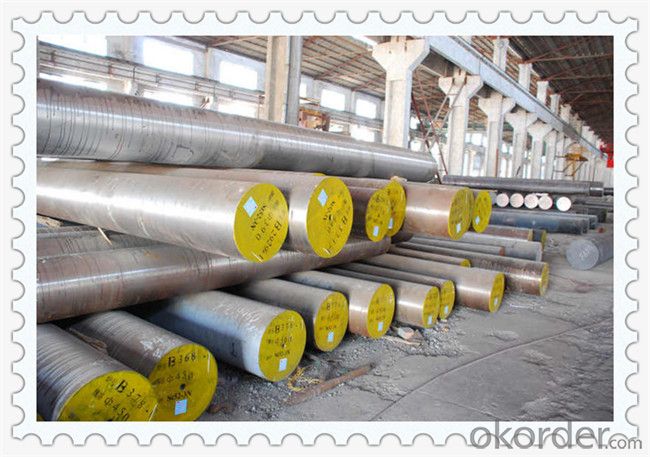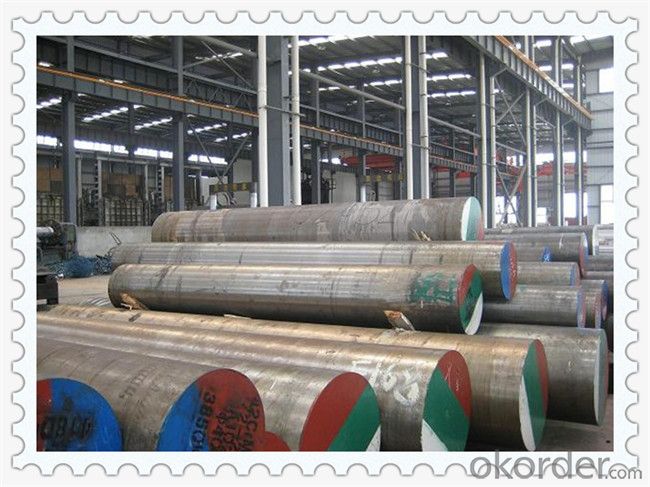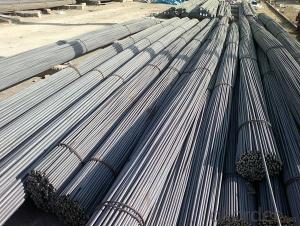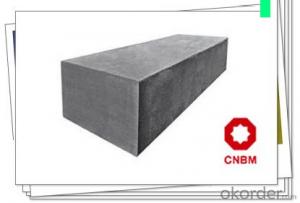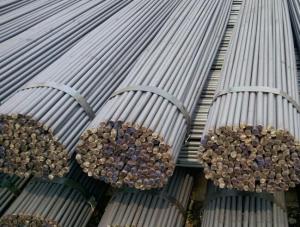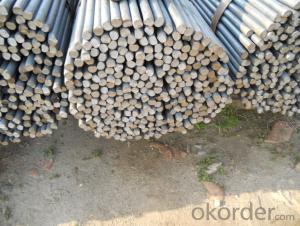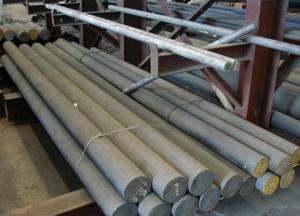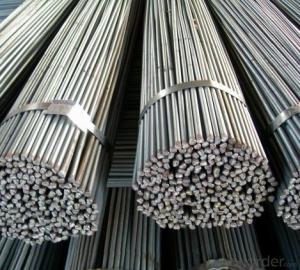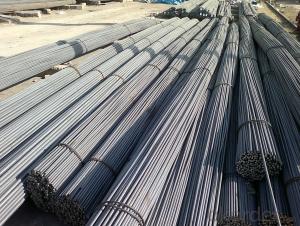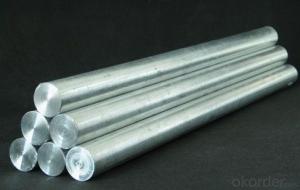Non-alloy Carbon Steel Round Bars
- Loading Port:
- China main port
- Payment Terms:
- TT OR LC
- Min Order Qty:
- 30 m.t.
- Supply Capability:
- 10000 m.t./month
OKorder Service Pledge
OKorder Financial Service
You Might Also Like
Non-alloy Carbon Steel Round Bars
Product Description
1, Diameter: 8mm-250mm rounds
5mm-9mm rods
2, Length: 2m, 3m, 5.8m, 6m or customized
3, Standard: GB, ASTM, AISI, SAE, DIN, JIS, EN
OEM technology - send detailed technical parameters for accurate quotation.
2, Produce Process: smelt iron - EAF smelt billet - ESR smelt billet -
hot rolled or forged to get the steel round bar and plate
3, Heat Treatment: annealing, normalizing, tempering, quenching
4, Surface Treatment: Black, Polished, Galvanized
5, Shape: Round, Square, Sheet, Plate, Pipe
6, Quality Assurance: We accept third party inspection for all orders.
You can ask testing organizations such as SGS, BV, etc. to test our products before shipping.
Products Show
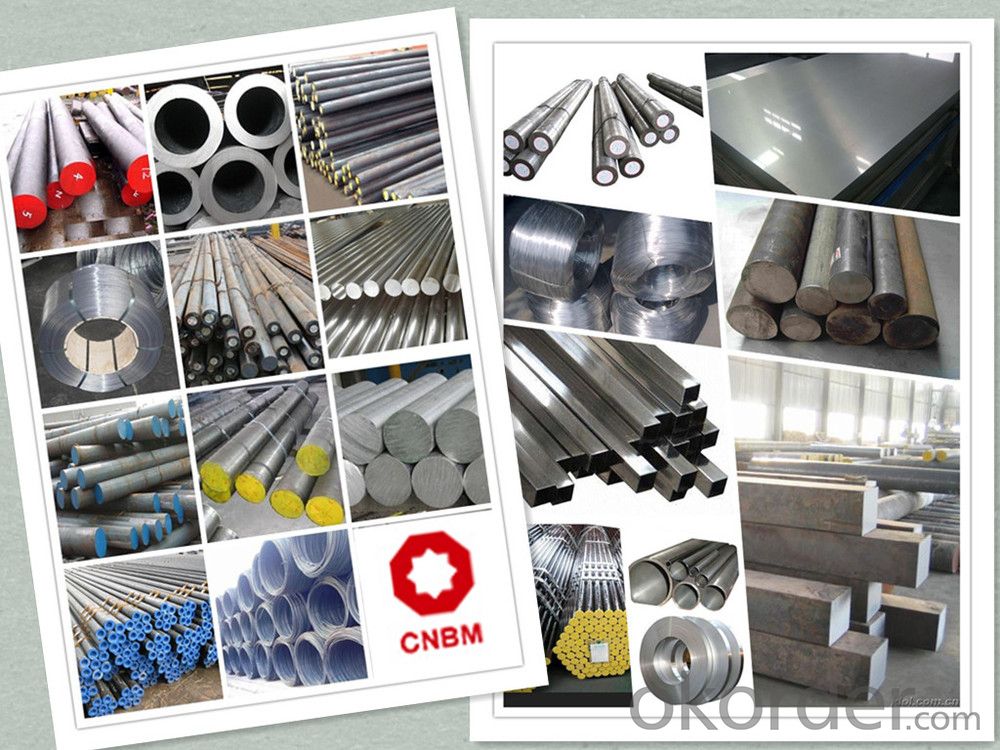
Product Overviews
| Product Name | Typical Grades | Diameter(mm) | Standard adopted |
| Carbon Steel | 20 (1020/S20C/C22) | Ø16-Ø300 |
GB/SAE/JIS/DIN
|
| 40 (1040/S40C/C40) | |||
| 45 (1045/S45C/C45) | |||
| Bearing Steel | GCr9 (51100/SUJ1) | Ø12-Ø250 | |
| GCr15 (52100/SUJ2/100Gr6) | |||
| GCr9SiMn (A485-Gr.1/SUJ3) | |||
Cr-Mo Steel | 20Cr (5120/SCr420H/20Cr4) | Ø12-Ø250 | |
| 40Cr (5140/SCr440/41Cr4) | |||
| 42CrMo(4140/SCM440/42CrMo4) | |||
| Gear Steel | 20CrNiMo | Ø16-Ø600 | |
| 20CrMn(5115/SMnC420/20MnCr5) | |||
| 20CrNiMo(8620/SNCM220/20CrMiMo2) |
Application
| Carbon Steel | Mold bottom, Plastic mold, Construction machinery parts Automobile parts, Security grills, Screens, Construction |
| Bearing Steel | Aerospace, Navigation, Nuclear energy, Chemical industry Electronic information, Petrochemical, Instrument and meter Transportation |
| Cr-Mo Steel | Mechanism & Fasteners gear, Stressed components for vehicles Engines and machines, Parts of larger cross-section |
| Gear Steel | All kinds of gears, Statically and dynamically stressed component for vehicles Engines and machine, Larger cross-section parts, Crankshafts |
Work Shop
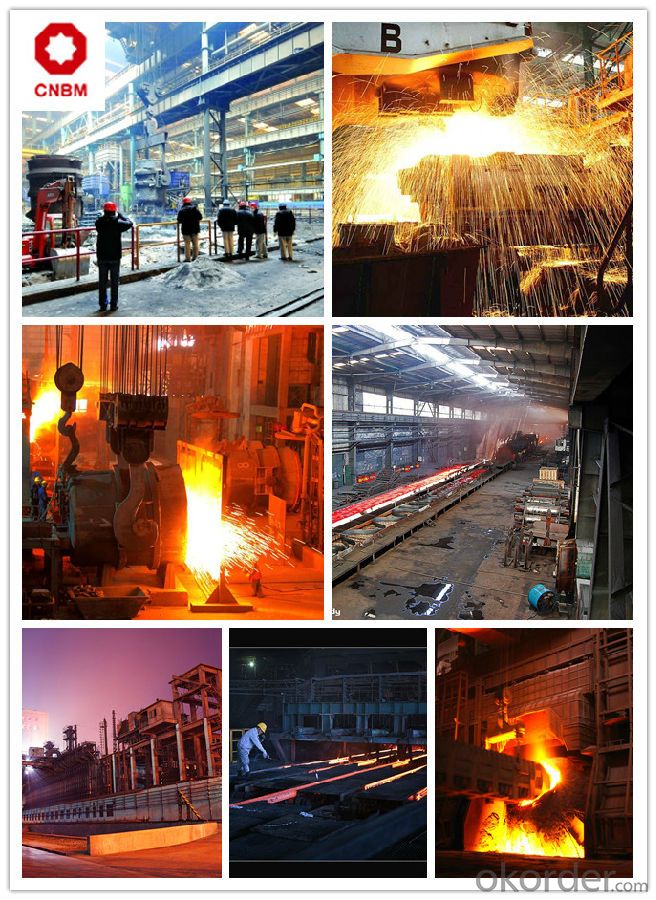
Company Information
CNBM International Corporation is the most important trading platform of CNBM group.
Whith its advantages, CNBM International are mainly concentrate on Cement, Glass, Iron and Steel, Ceramics industries and devotes herself for supplying high qulity series of refractories as well as technical consultancies and logistics solutions.

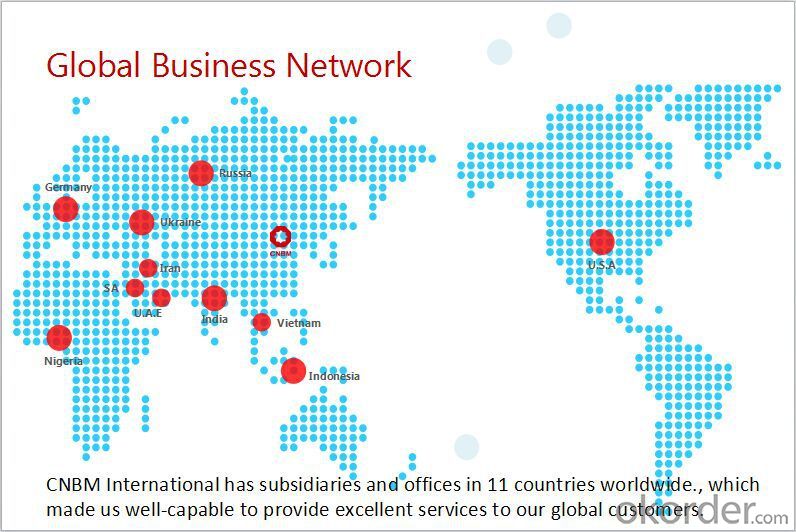
FAQ
1, Your advantages?
professional products inquiry, products knowledge train (for agents), smooth goods delivery, excellent customer solution proposale
2, Test & Certificate?
SGS test is available, customer inspection before shipping is welcome, third party inspection is no problem
3, Factory or Trading Company?
CNBM is a trading company but we have so many protocol factories and CNBM works as a trading department of these factories. Also CNBM is the holding company of many factories.
4, Payment Terms?
30% TT as deposit and 70% before delivery.
Irrevocable L/C at sight.
5, Trading Terms?
EXW, FOB, CIF, FFR, CNF
6, After-sale Service?
CNBM provides the services and support you need for every step of our cooperation. We're the business partner you can trust.
For any problem, please kindly contact us at any your convenient time.
We'll reply you in our first priority within 24 hours.
Packaging & Delivery
1, Packaging: seaworthy package or as required
2, Delivery: 35-45 days or based on quantity
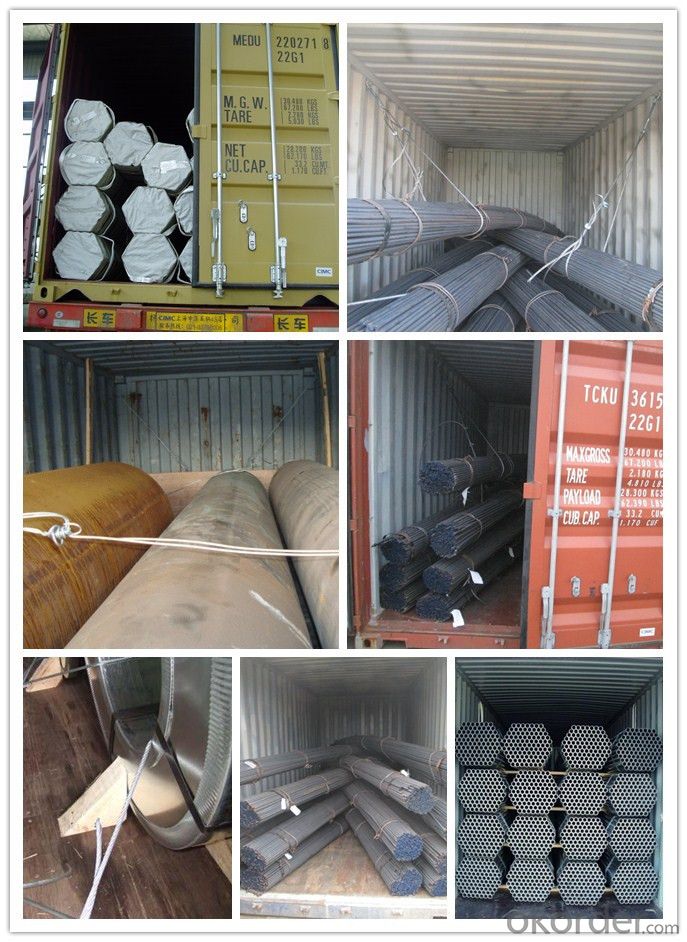
- Q: Are steel round bars recyclable?
- Yes, steel round bars are recyclable. Steel is one of the most commonly recycled materials in the world, and round bars made of steel can be easily melted down and reused to make new steel products.
- Q: Can steel round bars be used in the agricultural machinery industry?
- Yes, steel round bars can be used in the agricultural machinery industry. Steel round bars are known for their strength, durability, and versatility, making them suitable for various applications, including the agricultural machinery industry. These bars can be used to manufacture various components such as shafts, axles, gears, and connecting rods, which are essential for agricultural machinery. The high strength of steel ensures that these components can withstand the heavy loads and harsh conditions often encountered in agricultural operations. Additionally, steel round bars can be easily machined and welded, allowing for customization and efficient production of agricultural machinery parts. Overall, steel round bars are a reliable and cost-effective choice for the agricultural machinery industry.
- Q: Can steel round bars be bent or formed?
- Yes, steel round bars can be bent or formed. They have the ability to be shaped into various angles or curves through the application of force, typically using tools such as a hydraulic press or bending machine.
- Q: What are the advantages of using nickel-alloy steel round bars?
- There are several advantages of using nickel-alloy steel round bars. Firstly, nickel-alloy steel has excellent corrosion resistance, making it suitable for use in harsh environments or applications where the material is exposed to corrosive elements. Secondly, nickel-alloy steel possesses high temperature strength and resistance to thermal expansion, making it ideal for use in high-temperature applications such as aerospace or power generation. Additionally, nickel-alloy steel offers good mechanical properties, including high tensile strength and toughness, which make it suitable for demanding applications that require strength and durability. Overall, the use of nickel-alloy steel round bars provides a combination of corrosion resistance, high-temperature strength, and mechanical properties, making it a versatile and reliable material choice in various industries.
- Q: How do steel round bars perform under cyclic loading?
- Steel round bars generally perform well under cyclic loading due to their high strength and ductility. The ability of steel to withstand repeated loading and unloading without significant deformation or failure makes it suitable for applications where cyclic loading is present, such as in structural engineering, automotive components, and machinery. However, the performance of steel round bars under cyclic loading also depends on factors like the quality of the steel, design considerations, and the magnitude and frequency of the cyclic loading.
- Q: How are steel round bars used in the construction of dams and reservoirs?
- Steel round bars are commonly used in the construction of dams and reservoirs for reinforcement purposes. These bars are typically embedded within the concrete structures to enhance their strength and durability. The steel round bars act as a framework, providing structural integrity and preventing cracks or deformations in the concrete. This reinforcement ensures that the dam or reservoir can withstand the immense pressure and load exerted by the water, making them an essential component in the construction process.
- Q: How are steel round bars used in the manufacturing of material handling equipment?
- Material handling equipment commonly incorporates steel round bars due to their strength and durability. These bars are integral components in the construction of equipment such as cranes, forklifts, conveyors, and hoists. A primary application of steel round bars in material handling equipment is their use in load-bearing structures. They are specifically utilized in the construction of masts, booms, and jibs of cranes and hoists, as these components must endure heavy loads and provide stability. Steel's high tensile strength and resistance to bending make it an optimal choice for these critical parts. In addition, steel round bars are employed for shafts and axles in material handling equipment. These components play a vital role in transmitting power and torque, facilitating efficient equipment operation. Steel's ability to withstand substantial stress and torsional forces makes it an ideal material for these purposes. Steel round bars are also commonly utilized in the fabrication of lifting attachments and hooks for material handling equipment. These bars are skillfully shaped and welded to create the necessary lifting mechanisms, ensuring safe and secure transportation of heavy loads. Steel's strength and rigidity enable it to withstand the forces exerted during lifting operations. Furthermore, steel round bars find application in the manufacturing of conveyor systems. These bars function as rollers or shafts, supporting and guiding the movement of materials along conveyor belts. The smooth surface of steel bars minimizes friction, enabling efficient material handling. In conclusion, steel round bars are indispensable in the manufacturing of material handling equipment. Their strength, durability, and versatility render them suitable for a wide range of applications, including load-bearing structures, shafts, lifting attachments, and conveyor systems.
- Q: Are steel round bars resistant to abrasion?
- Yes, steel round bars are generally resistant to abrasion. Steel is known for its high strength and durability, making it resistant to wear and tear caused by friction or rubbing against other surfaces. However, the level of abrasion resistance can vary depending on the specific type of steel and its composition. Certain grades of steel, such as hardened or alloy steels, are specifically designed to have enhanced resistance to abrasion. These steels undergo processes like heat treatment or alloying to increase their hardness and improve their ability to withstand abrasion. Overall, steel round bars are a reliable choice for applications where abrasion resistance is important.
- Q: What are the different types of steel round bar surface treatments?
- There are several different types of surface treatments that can be applied to steel round bars to enhance their appearance, durability, and resistance to corrosion. Some of the most common surface treatments include: 1. Hot-dip galvanizing: This process involves immersing the steel round bar in a bath of molten zinc to create a protective zinc coating. This coating helps to prevent rust and corrosion, making it ideal for outdoor applications. 2. Electroplating: Electroplating involves coating the steel round bar with a layer of another metal, such as chrome or nickel. This not only enhances the appearance of the bar but also improves its resistance to corrosion. 3. Powder coating: In this process, a dry powder is applied to the surface of the steel round bar electrostatically and then cured under heat. This creates a hard, durable, and attractive finish that is resistant to chipping, scratching, and fading. 4. Passivation: Passivation is a chemical process that removes impurities from the surface of the steel round bar, leaving behind a clean and corrosion-resistant layer. This treatment is commonly used for stainless steel bars to enhance their resistance to rust. 5. Black oxide coating: Black oxide coating is a conversion coating that forms a thin layer of black iron oxide on the surface of the steel round bar. This treatment provides mild corrosion resistance and also gives the bar a sleek black appearance. 6. Shot blasting: Shot blasting involves propelling abrasive materials at high speeds onto the surface of the steel round bar to remove any impurities or scale. This treatment not only improves the appearance but also creates a roughened surface that promotes better adhesion of coatings. 7. Acid pickling: Acid pickling is a process that removes scale and impurities from the surface of the steel round bar by immersing it in an acid bath. This treatment leaves the surface clean and free from any contaminants. These are just a few examples of the various surface treatments available for steel round bars. The choice of treatment depends on factors such as the intended use of the bar, the desired appearance, and the level of corrosion resistance required.
- Q: How do steel round bars compare to carbon fiber round bars?
- Steel round bars and carbon fiber round bars have different characteristics and applications. Steel round bars are known for their high strength and durability, making them suitable for heavy-duty applications. They can withstand higher loads and provide excellent resistance against wear and tear. On the other hand, carbon fiber round bars are significantly lighter than steel bars while still maintaining high strength. They are commonly used in applications where weight reduction is crucial, such as aerospace and sports equipment. Carbon fiber round bars also offer better corrosion resistance compared to steel. The choice between steel and carbon fiber round bars depends on the specific requirements of the application, considering factors such as strength, weight, and cost.
Send your message to us
Non-alloy Carbon Steel Round Bars
- Loading Port:
- China main port
- Payment Terms:
- TT OR LC
- Min Order Qty:
- 30 m.t.
- Supply Capability:
- 10000 m.t./month
OKorder Service Pledge
OKorder Financial Service
Similar products
Hot products
Hot Searches
Related keywords
